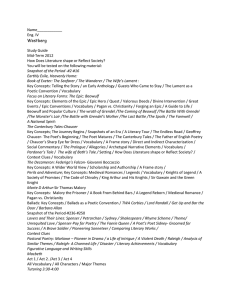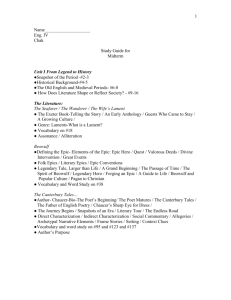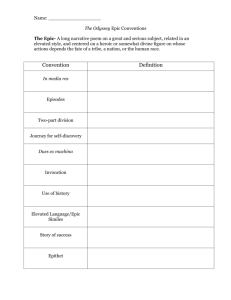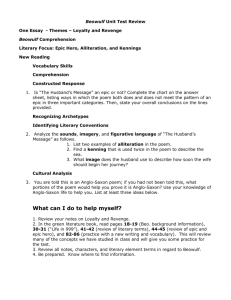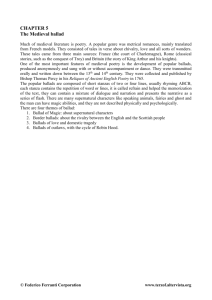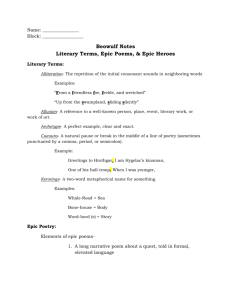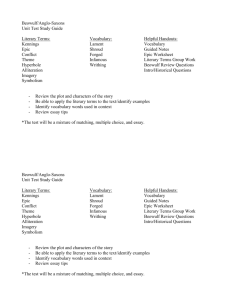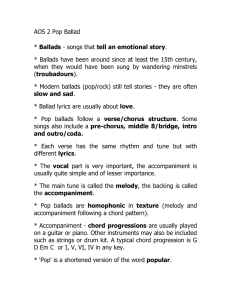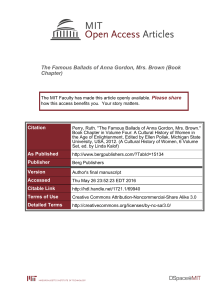Anglo-Saxon Literary Terms
advertisement
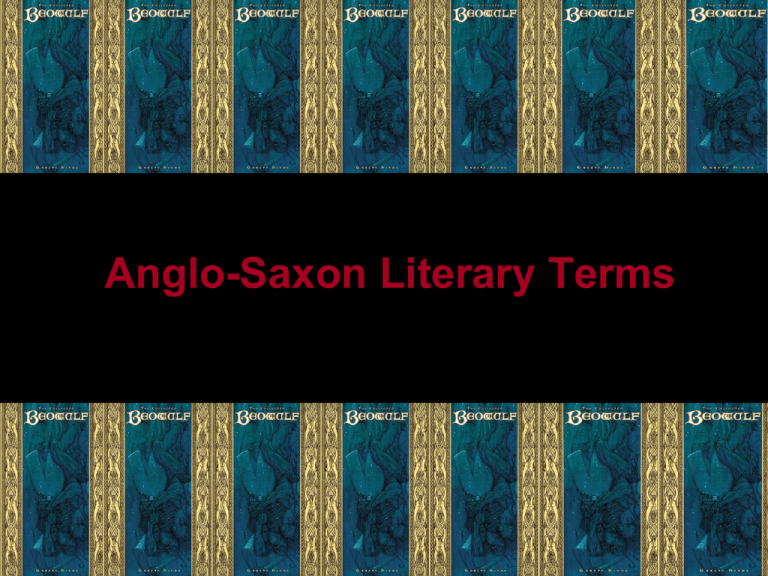
Anglo-Saxon Literary Terms Epic • • • • A long narrative poem On a serious subject Written in a grand or elevated style Centered on a larger-than-life hero Epic Conventions • A concern with the fate of a nation or people • A correspondingly large scale, often ranging around the world • The intervention of supernatural figures • Extended similes, generally called epic similes: A simile is an explicit comparison of two things, usually with the word "as" or "like." • Long catalogues, whether of ships, characters, or places • Extensive battle scenes; • Begins “in medias res” Caesura • a pause somewhere in the middle of a verse. Some lines have strong (easily recognizable) caesurae, which usually coincide with punctuation in the line, while others have weak ones. Kenning • a compound poetic phrase substituted for the usual name of a person or thing. For example the sea in Old English could be called seġl-rād 'sail-road', swan-rād 'swan-road'. In line 10 of the epic Beowulf the sea is called the hronrāde or 'whale-road' Epic Boast • A proclamation of things a character has done or will do in the epic Archetype • The word archetype is commonly used to describe an original pattern or model from which all other things of the same kind are made. Comitatus • An agreement made between a lord and his thanes, in which the thanes swear to defend a lord to their death, while he provides them with protection and a share of his wealth and weapons Oral Tradition • A process by which songs, ballads, folklore, and other material are transmitted by word of mouth. The tradition of oral transmission predates the written record systems of literate society. Fate • The principle or determining cause or will by which things in general are believed to come to be as they are or events to happen as they do. Thane • A warrior or retainer who follows and fights for his lord. Mead • A fermented beverage made of water and honey, malt, and yeast Pagan • Paganism is a catch-all term which has come to bundle together (by extension from its original classical meaning of a non-Christian religion) a very broad set of not necessarily compatible religious beliefs and practices that are usually, but not necessarily, characterized by polytheism Alliteration • Alliteration occurs when the initial sounds of a word, beginning either with a consonant or a vowel, are repeated in close succession. The function of alliteration, like rhyme, might be to accentuate the beauty of language in a given context, or to unite words or concepts through a kind of repetition. Ballad • A short poem that tells a simple story and has a repeated refrain. Ballads were originally intended to be sung. Early ballads, known as folk ballads, were passed down through generations, so their authors are often unknown. Later ballads composed by known authors are called literary ballads. Dream Vision • Also known as Dream Allegory. A literary convention, chiefly of the Middle Ages. In a dream vision a story is presented as a literal dream of the narrator. Ecclesiastical • Ecclesiastical means pertaining to the Church (especially Christianity) as an organized body of believers and clergy, with a stress on its juridical and institutional structure. Epithet • A word or phrase, often but not always disparaging or abusive, that expresses a character trait of someone or something. Icon • By extension, icon is also used in the general sense of symbol — i.e. a name, face, or picture that is readily recognized by most people to represent some well-known entities or attributes. Lament • A lament is a song or poem expressing grief or regret. Many of the oldest and most lasting poems in human history have been laments. It is sometimes also called a dirge. Motif • A theme, character type, image, metaphor, or other verbal element that recurs throughout a single work of literature or occurs in a number of different works over a period of time. Narrative • A verse or prose accounting of an event or sequence of events, real or invented. The term is also used as an adjective in the sense "method of narration." For example, in literary criticism, the expression "narrative technique" usually refers to the way the author structures and presents his or her story. Scop An Anglo-Saxon poet The scop fulfilled many roles in an Anglo Saxon tribe. Among those functions were: • court singer • tribal historian • genealogist • teacher • composer • critic • warrior • traveler and reporter
